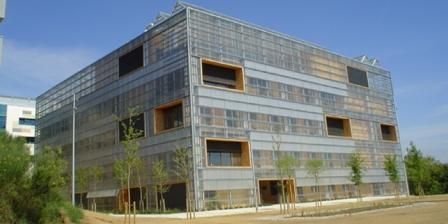
14/10/2014
UAB Inaugurates ICTA-ICP Building
UAB Inaugurates ICTA-ICP Building
The new main offices of the Institute of Environmental Science and Technology (ICTA) and the Institut Català de Paleontologia Miquel Crusafont (ICP) were inaugurated on October 10 at the Universitat Autònoma de Barcelona (UAB) the Barcelona Synchrotron Park works with.
The new building, unique thanks to the sustainability criteria with which it was constructed, controls its temperature through a bioclimatic “outer skin”, reducing energy consumption levels up to 62% and water consumption up to 90% in comparison to conventional buildings: the building achieved a LEED GOLD certification by the US Green Building Council.
With 206 and 55 employees respectively, both ICTA and ICP are world-class research centers that have now with these new shared main offices a new tool at their disposal to work better.
News based on the press released issued by the UAB.
Image: www.ovingenieria.es
The new building, unique thanks to the sustainability criteria with which it was constructed, controls its temperature through a bioclimatic “outer skin”, reducing energy consumption levels up to 62% and water consumption up to 90% in comparison to conventional buildings: the building achieved a LEED GOLD certification by the US Green Building Council.
With 206 and 55 employees respectively, both ICTA and ICP are world-class research centers that have now with these new shared main offices a new tool at their disposal to work better.
News based on the press released issued by the UAB.
Image: www.ovingenieria.es
More news
03/01/2020
AllRead MLT, a success story originated from the PRUAB’s Ideas Generation Program
06/11/2019
SENER, a top-class aerospace systems provider
29/10/2019
The ICN2 research center is involved in the quantum revolution
21/10/2019
Stradivarius keeps growing
19/09/2019
The president of Catalonia visited the Barcelona Synchrotron Park
12/09/2019
Alba, a tool to tackle challenges in the fields of renewable energy production and fight against air pollution









